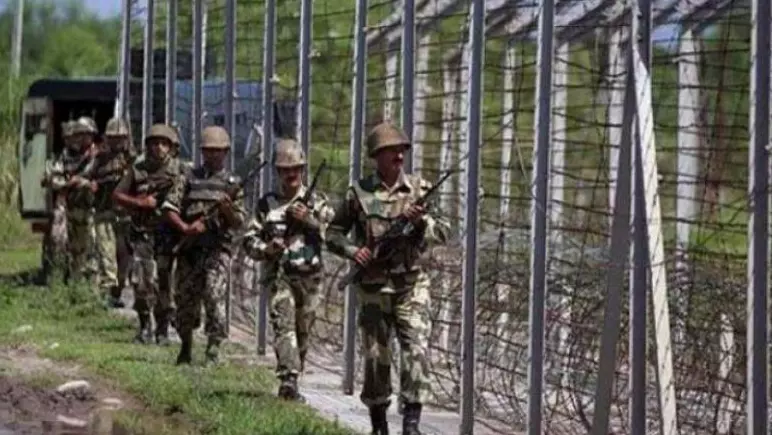6 J&K Employees, Part of Cross-LoC 'Narco-Terror Network', Sacked

Srinagar: The Jammu and Kashmir government on Saturday fired six of its employees including five policemen and a schoolteacher on charges of being involved in ‘narco-terrorism’ and other anti-national activities.
“They have been dismissed from service in terms of Article 311 of the Constitution of India for their deep involvement in anti-national activities. Their activities had come to the adverse notice of law enforcement and intelligence agencies, as they found them thickly involved in activities prejudicial to the interests of the State evidencing their involvement in terror related activities,” a statement issued by the government said.
Article 311 provides for dismissal, removal or reduction in rank of a person employed in civil capacities under the Union or a State. The J&K government said that Lieutenant Governor Manoj Sinha is satisfied after considering the facts and circumstances of the case(s) and based on the information available, that the activities of these officials are such as to warrant their dismissal from service.
Each dismissal order served on Head-Constable Farooq Ahmad Sheikh, Selection Grade Constables Saifuddin, Khalid Hussian Shah and Irshad Ahmad Chalkoo, Constable Rahmat Shah and schoolteacher Nazam Din further states that the Lt. Governor is satisfied under sub-clause (c) of the proviso to clause (2) of Article 311 of the Constitution of India that “in the interest of the security of the State, it is not expedient to hold an enquiry in the case(s)” and, accordingly, they have been dismissed from service “with immediate effect."
All of them have been charged with being a part of the cross-LoC narco-trade which is also used for providing various terrorist organisations with lucrative sources of funding and for fuelling unrest in J&K.
A recent study said that the drug abuse in J&K is among the highest in the country. The J&K government has, however, taken a strong stance against drug dealers and traffickers within the Union Territory, implementing a strict zero-tolerance policy. It has initiated a campaign known as "Nasha Mukt Abhiyaan" to combat the issue of drug abuse. The police and other official agencies have over the past few years arrested hundreds of drug-peddlers and seized huge quantities of narcotic substances across J&K under the Prevention of Drug Abuse & Narcotics Trade (NCORD) and other relevant provisions of the law.
The officials said that while acting tough against its employees accused of being involved in anti-national and anti-social activities, the J&K government has since August 2019 when J&K was stripped of its special status and split up into two Union territories, dismissed nearly seventy of its officials and other employees from services on similar charges after invoking Article 311.
An official spokesman reiterated on Saturday that the government has “adopted a zero-tolerance policy towards the anti-national elements who have been taking advantage of being in the government service”.
Saifuddin has been accused of being a notorious drug peddler, a habitual offender and a mastermind for generation and distribution of narco-terror funding”. The statement said that he is “deeply motivated and committed drug peddler as well as an Over Ground Worker for the terrorists of proscribed Hizb-ul-Mujahideen” and he had “established drug channels which are being used by anti-national agencies and elements to smuggle weapons, narcotics and to facilitate infiltration of terrorists in J&K”.
Farooq Sheikh had along with Khalid Hussian and Rahmat Shah “received huge consignment of narcotics from drug smugglers operating in Pakistan-occupied-Jammu and Kashmir” and he has had “contacts” with the Pakistan-based terrorists, who have been involved in smuggling of narcotics, weapons and money from across the Line of Control (LoC), the statement said.
Khalid Hussian, the statement said, being a resident of Tangdhar, an area which falls in proximity of the LoC, “used his expertise of local terrain and topography to establish contacts with narcotic drug smugglers across the border in PoJK and was at the forefront of running a drug cartel in Kupwara-Karnah region”.
“Rahmat Shah, had received huge consignment of narcotics from across the LoC for peddling it to other parts of the country, including local market for profit motive and for a larger game plan of an adversary agency to destabilize J&K”, the statement said. It added, “Being a resident of Haridal village in Karnah (Kupwara district) he leveraged his knowledge of the local terrain and topography to establish connections with the narcotic smugglers across the border in PoJK.”
They have also been accused of using the money raised through the illegal drug trade for fuelling unrest as well as financing the terrorism activities in the Kashmir Valley and other parts of the country.
Chalkoo had “developed close relationships with the terrorist associates of the border region of Uri area and started working as an Over Ground Worker with the proscribed terrorist organization Lashkar-e-Taiba (LeT). “He was in close contact with various Kashmiri origin terrorists based in PoJK, through encrypted messaging applications and had received arms and ammunition for further delivery to the terrorists. Being the resident of Uri (Baramulla district), he utilized his knowledge of the local terrain to establish contacts with terrorists based in PoJK. He used to assist terrorist groups, during infiltration, by providing logistics and transportation of their illegal arms and ammunition in the interior areas of Kashmir Valley”, the statement said.
Nazam Din “is a highly motivated and committed drug peddler and an Over Ground Worker of terrorists of Hizb-ul-Mujahideen outfit. He had received consignments of narcotics from across the LoC for onward delivery to the drug peddlers even in Punjab. He was in constant touch with hard core terrorists in Pakistan, who ex-filtrated for terrorist training and are currently active in terrorist activities from PoJK. He smuggled drugs from Pakistan and money generated through illegal trade of these drugs, it was used for fuelling unrest as well as financing the terrorism activities in the Kashmir valley, as well as other parts of the Country, being an important source in the narco-terror system”, the statement said.

